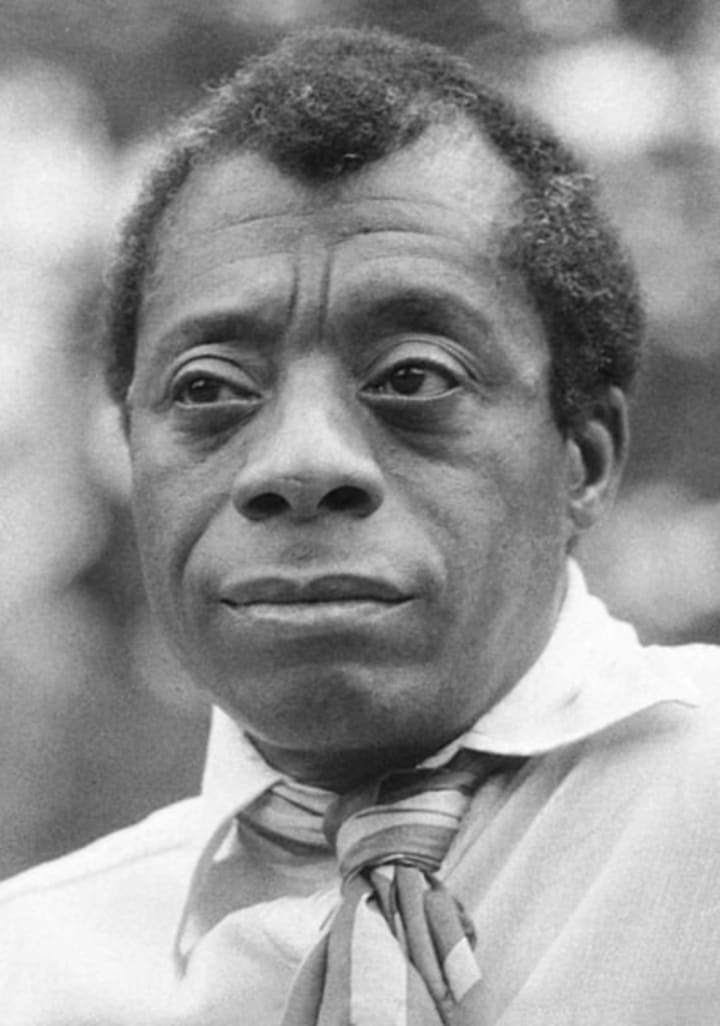Celebrating Black History Month with African-American Author James Baldwin
Adversity drove Baldwin to become a writer
People are trapped in history and history is trapped in them. — James Baldwin
Meet the writer James Baldwin
After reading Baldwin’s Going to Meet the Man, I was deeply moved by this well-written book, so much so that it took me nearly a week to digest everything he was saying. The fact he could have the perception of a white person does not amaze; moreover, it tells me there were words in him screaming to come out. These words were delivered from his emotions, life experiences of oppression, and perhaps emotional deprivation in his childhood.
Also, they would not have been so succinctly stated in a short story if he did not have passion and compassion for his culture, nor the desire to command respect, respect which is a God-given right. The articulated words are to be valued for what they were trying to say of his culture and to his culture, as well as what they communicate to “white America.” So, then, would Baldwin have succeeded to have a place in the literary spotlight if he had not been a victim of oppression, and how did he try to reach “white America?”

Baldwin’s life
To understand where Baldwin’s writing style and language came from, it’s important to address some underlying events in Baldwin’s life that contributed to his state of being. First, he was born illegitimately in Harlem, which to Baldwin was a factor that “white America” attached to his culture. He would spend a good deal of his life looking for the perfect father who, for example, could have been emotionally supportive of his pursuits towards his writing. This search, however, was illustrative in his comparison to the African American culture also being denied their heritage by people who could only see “white.” Baldwin was just one of the many spectators of the “moral failure” in America and believed that it could be restored or rehabilitated with and by love. (James Baldwin: A Biography by David Leeming, pub. 1994).
Baldwin’s stepfather became for him the classic “black father” who was one generation from slavery and who, because of all the racial discrimination, was prevented from providing for his family in the manner that he would have liked — he would have liked to have given them their identity as individuals rather than as members of a class or a race. Because Baldwin’s stepfather was somewhat submissive to the white race, Baldwin began to lose respect for him. His stepfather was a practicing preacher and his feelings of oppression were transformed into anger and a certain amount of power in his ministry. Indeed, Jimmy, as his friends called him, took the brunt of his stepfather’s disappointments with life.
When Baldwin was five, his stepfather had him circumcised, which might have been to cleanse him of being born illegitimate. Also, Baldwin had a recollection of being beaten because he lost 10 cents which he was to use to purchase kerosene for their stove. His father used to ridicule him by telling him that he was the most unsightly child he had ever seen. It would make sense that he was plagued as a child by his stepfather while trying to also understand the stage of events occurring in his environment as well as society as a whole towards the culture to which he belonged. His stepfather was ultimately committed to a mental hospital in 1943 and there, he died of tuberculosis. As an example of how Baldwin finally was able to reach a point in his life wherein he understood the man in his stepfather, he wrote in The Devil Finds Work, (p. 12) the following:
[T]he pride and sorrow and beauty of my father’s face: for that man I called my father really was my father in every sense except the biological, or literal one. He formed me, and he raised me, and he did not let me starve: and he gave me something, however harshly, and however little I wanted it, which prepared me for an impending horror which he could not prevent.
Baldwin came to believe his stepfather was a product of his society in that if he was incapable of showing the love that he should have shown to him, as well as the other siblings in the family, it was partly due to the fact that he found so little love in his environment or society. And, that there was no easy solution to their circumstance, a circumstance that announced they were not “white,” and, therefore, they were to be branded for the rest of their lives.
It was Baldwin’s mother who incessantly reminded him and the other siblings that people should be treated fairly and should be unconditionally accepted. Life just kept fueling Baldwin’s language and writing experiences.
Escaping the reality of racism
At least in Harlem, though there was still the issue of racism, there was more of a sense of community as opposed to isolation, which was apparent in the southern states. In school, Baldwin’s teachers could see how intelligent he was. There would come a point in time, however, when Baldwin, with his art of words, would relocate to Paris to escape the reality of racism in America.
Indeed, in seeing people escape from common circumstances in their daily lives to a lesser degree of a situation or problem, to the degree of a circumstance which has problems weaving in and out of it concerning racism, it is no surprise, nor peculiar, why Baldwin would seek refuge to perfect his craft in Paris.
Baldwin knew he had a voice that needed to be heard, and in him were words begging to come out. There would be no black if there were no white, if everything was just the “same.” In a country that announces equality, it does seem like a two-faced friend at times wherein there is the occasional sneer behind the back. Baldwin’s view of the world, his childhood experiences, his environment, his culture, the events that transpired throughout his life that reeked of racism — all these things were like lines in a play and Baldwin’s words were woven into these lines and all that was in him was put forth in his words and because of who he was and what he tried to accomplish and how he tried to influence the white community with his craft, it was because of all this that he put himself into the spotlight. It was because he had compassion for his culture and he was not afraid to write a word or to have a voice in which to deliver a sound to force those who needed to listen, to hear, and to empathize.
In reference to white people, Baldwin said, “I’ve always understood them a lot more than they’ve ever understood me.” (James Baldwin Artist on Fire: A Portrait by William J. Weatherby, pub. 1989). He also said that “to hate, to be violent, is demeaning. It means you’re afraid of the other side of the coin — to love and be loved.” Baldwin had intellect and perception and compassion. He wrote with passion and he learned to deal with his fears, his animosities, anger, his relationship with his stepfather, and an oppressed portion of society.
Attitudes
My dad was “white” and my mom was Asian. My brother and I grew up with certain prejudices and we, therefore, were never taught to practice having attitudes towards others. What society needs is a reconditioned mind and a rebuilt spirit, both of which sound less than complicated, but in reality, neither can be accomplished without respect and compassion, and love. I believe that Baldwin, in his words, was trying to say this very thing, and it takes courage and love to speak out against oppression. I am ashamed of people who treat people with any unkind word or act. I was ashamed of the people who used to belittle my mom telling her she should go back to where she came from. Well, she came from America.
To feel racially isolated as Baldwin did, could only add to his anger and disappointment as well as a lack of tolerance, and all these emotions coupled with his personal sexual life (he was also gay) would ultimately give rise to attempted suicide. Baldwin knew of others who could not deal with being oppressed and suicide was the end result. This he understood.
“Love takes off masks that we fear we cannot live without and know we cannot live within. I use the word ‘love’ here not merely in the personal sense but as a state of being, or a state of grace — not in the infantile American sense of being made happy but in the tough and universal sense of quest and daring and growth.” (Excerpt from The Fire Next Time by James Baldwin, 1963).
Although over time, there has been a rise in the level of understanding among whites for the blacks, I feel it’s more a matter of acceptance that should be the initial concern. It is apparent to me that Baldwin’s message seems to be that he was born into a culture that was incessantly struggling for freedom and identity and that this country was so hung up on color, so much so that truths in virtue, morality or equality, let alone compassion and real love for humanity regardless of race, were consistently set aside for naught. Baldwin’s message was clear: don’t think so white and you won’t think so black. Furthermore, he seemed to be saying, “Let freedom ring.”
Why should the whites have such a superior mannerism such that they reached a point in time where a “willingness” could be encountered regarding racial segregation? What kind of nonsense is that? Why should one human being have to be willing to have compassion towards another human being? Why should human beings because of their athletic abilities, such as Jesse Owens or Jackie Robinson, influence the way “white America” thinks? I mean, bless them for their contributions, but why did it take those efforts to help influence this society?
'Going to Meet the Man'
In Going to Meet the Man (1965), the whole story reeks of oppression and fears, and hate. When a young black boy is beaten in jail, Baldwin’s language is wanting his reader to feel the pain and pride and long-suffering of his culture as well as to witness injustice. So much, it seems that fear and ignorance play a role in so many circumstances related to racism. Also, in the story, it could be that character, Grace, represented the lack of affection Baldwin experienced in his life with his stepfather. The events that transpired at the end of the story made me sick to my stomach, but the reality of such occurrences should do just that to any human being that is made of the right good stuff. People need to reinvent who they are and learn to recondition their minds, which was what I kept thinking after being so affected by the story. Baldwin does an excellent job of arousing emotion and that is what good writing is about.
Going to Meet the Man contains a plot occurring in the 1960s involving a sheriff of a southern town who was conditioned as a boy to be a racist. He also didn’t like the way the town is changing.
At least Baldwin was able to witness President Truman’s decision to desegregate the armed forces. At least Baldwin could read about the famous Brown v. Board of Education decision announcing the inequality in “separate educational facilities.” Yes, it was a slow crawl to somewhat recondition minds and it is one of the saddest things on this planet to know that children at one time had to go to separate schools just because of the color of their skin.
We’re talking about children. At least Baldwin could read about these changes. At least he experienced the civil rights movement. At least he did not sit still on some bench somewhere without taking his insides and unfolding what rested therein through his pains and his being a part of an oppressed race, and putting it all into words — language that would live.
If Baldwin had not experienced oppression or witnessed its activities within his culture, he still would have had the perception and good eye for words, but because of these things, his mind would bleed onto paper. His passion grew from oppression and because of this, what he wrote spelled a form of truth that shouted inequality and injustice. The only way he could reach “white America” was through his written words.
For those who value impactful writing, James Baldwin’s work should not be left on some forgotten bookcase. As people continue to read his exceptional works, his effectiveness will continue to live.

© Cathy Coombs
About the Creator
Cathy Coombs
Earning a B.A. in English Journalism & Creative Writing confirmed my love of literature. I believe every living experience is tied to language, and words influence us all.
Website. Write, self-publish, and self-market. Go.








Comments
There are no comments for this story
Be the first to respond and start the conversation.